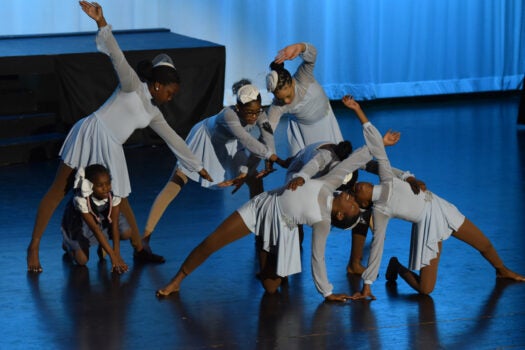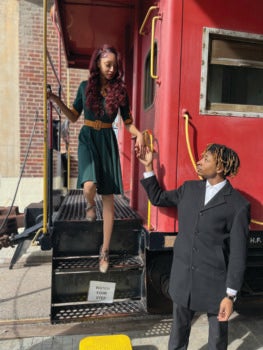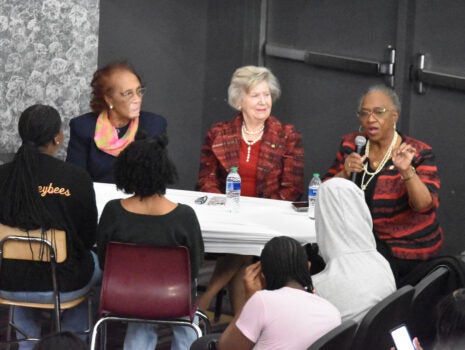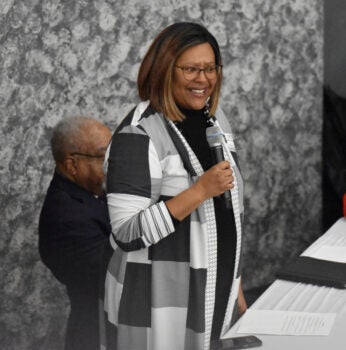Traveling through time: Salisbury High Black History Month exercise, celebration puts today’s students through yesterday’s tribulations
Published 12:10 am Thursday, February 29, 2024
SALISBURY — You cannot really know where you are going until you know where you have been.
Students at Salisbury High School capped off Black History Month by learning about the Green Book. Formally “The Negro Motorist Green Book,” was a guidebook for Black roadtrippers. It was created by Victor Hugo Green, a Black New York City postal worker who published it annually from 1936 to 1966.
The Green Book was a directional beacon for Black travelers to places for safe lodging and places to eat while in unknown areas of the country during the time of Jim Crow-era segregation when discriminatory practices were pervasive throughout much of the U.S.
Last year, Salisbury High School students recreated desegregation-era photos from a time when white students attended Boyden High School while their Black counterparts went to J.C. Price and Dunbar. Those students did more than photograph themselves in the era, though. They mapped a hypothetical trip from Athens, Georgia, to Detroit; planning stops that took them through such destinations as Louisville, Kentucky, and Fort Wayne, Indiana.
Albeit hypothetical for the students, the exercise proved illustrative in demonstrating the planning that went into traveling as a Black person or family during that time period.
This year, several students recreated Jim Crow-era traveling photographs, visiting the N.C. Transportation Museum in Spencer for an authentic result.
On Monday, Salisbury High School students crowded into the school’s auditorium for interpretive dance performances, a recitation of the Black national anthem, “Lift Every Voice.”
The dance performance highlighted the actions of Ruby Bridges, the first Black child to attend formerly whites-only William Frantz Elementary School in Louisiana during the New Orleans school desegregation crisis on Nov. 14, 1960.
A voiceover by Bridges herself chronicled what that adversity was like and explored how a relationship with one student who saw her not for the color of her skin helped steady her during the turbulence.
The event also featured a panel discussion with several local figures who lived through the days of Jim Crow discrimination.
Those speakers included East Spencer Mayor Barbara Mallett, Dr. Jewell Holland, Livingstone College Vice President Dr. State Alexander, former Salisbury Mayor Al Heggins and current Salisbury Mayor Karen Alexander.
Students asked the panelists a series of questions, the first of which was, “Was it hard living in a community knowing you had limits in your daily life?”
Fielding that question, Mallett said, “We all knew which direction we were supposed to go in. When I grew up, I lived in the country. We did not have a bus service in the country, so my parents would take us to town. We did not go but once a week, if we went at all.
“When we went to high school, we left our little country to go into town. (Our elders) gave us advice like keep together, make sure you knew where you were going and that you had a few pennies in your pocket.
“One thing our parents taught us was not to fear. Don’t be fearful of your surroundings.”
Another student asked how did you manage to keep your mind positive and focused on the end goal in a place with so many restrictions for African Americans?
State Alexander, who grew up in a segregated Winston-Salem, indicated that insulation actually helped.
“We were fortunate because there was a bus company owned by African Americans so that even though we were restricted, we could still get around the city,” State Alexander said. “In my neighborhood, we had a great composite of people that lived there. Principals, doctors and regular folks.”
Adding to State Alexander’s remarks, Holland said, “There is one thing no one can take from you, and that is your mind. You may restrict my body by limitations but my mind you cannot control. We were embedded with the idea that if you had to sit upstairs in the Capitol Theatre, take that as the best spot.”
Holland explained that contrary to a lot of beliefs, segregation was not confined to the South, pointing to experiences from Tacoma, Washington, where Black neighborhoods were often farther from the town center on hard-to-access hills.
“We looked at the good part,” Holland said. “They might have thought they were putting us up on a hill, but we got the best view of Puget Sound.
“Turn your lemons with some sugar and make some lemonade out of it.”
The conversation then turned to the subject matter of the Green Book and traveling through areas where one might not have always been welcomed.
“One of the things that were very good about the Great Migration is that our cousins, aunts and uncles moved to cities in the northern states,” State Alexander said. “That kept us in a network, and we did not have to stop at hotels, but we did have to plan for bathroom stops.”
At times, when hotel lodgings were inaccessible and a safe home to stay might not have been available either, State Alexander said they would stay in funeral homes.
“It was kind of spooky, but we did that anyway,” State Alexander said.
Planning for long trips meant having adequate supplies for long distances.
Mallett said, “I remember packing food. Back then, they canned items — peaches and apples and fruits and vegetables. Then, we would pack books so we could read along the way. We did not have games, so we read and just enjoyed the trip.”
State Alexander added, “For us with food, we always packed a big box and a thermos so we could have something to drink along the way. You always packed food for the worst end of conditions. You had to carry with you everything essential that you might need.”
As the discussion continued, desegregation became the forefront.
Heggins had a unique perspective to share about her graduating class at A.L. Brown High School in Kannapolis.
“When I was in high school, our class when we graduated in 1982, our superintendent made an announcement that this is the first class to go all 12 years in an integrated school system,” Heggins said. “From 1st grade to 12th grade, we had all gone to school interracially.”
What might have seemed like an impossible dream for some of Heggins’ forebears did not quite resonate at the time.
“We did not understand what the big deal was because we had been with each other all 12 years,” Heggins said.
Karen Alexander shared an account of her high school days and how desegregation changed her perspectives.
“My high school was the first time there was integration,” Karen Alexander said.
She specifically remembered one student who excelled on the football field and in the hallways.
“He was a football player and the most popular guy in our school,” Karen Alexander said.
Before closing, the panelists offered some words of encouragement for the students.
Pointing to Javon Hargrave’s recent jersey retirement speech at North Rowan High School on Feb. 16, Mallett shared his words: “Whatever I put in, that’s what I am going to get.”
Adding to that, Mallett said, “What you have to remember, you have to see yourself being taught and being successful. If you see that, you will obtain your goals.”
Echoing Bridges’ voiceover, Holland encouraged the students not to be intimidated by social stigmas and situations.
“Don’t be afraid to reach out or be intimidated to have white friends,” Holland said. “There is still lots to be done.”
State Alexander left the students with a message to take advantage of an ever-changing world.
“Do not be afraid to reach out,” State Alexander said. “We are living now in a world that is more global than it used to be in my time.
“America is a stronger place because you have the opportunity to learn from each other and don’t be sequestered in a box.”
In her closing remarks, Heggins issued a directive to the students.
“When I was growing up, parents always told me that people will say mean things about you,” Heggins said. “They would always tell me, ‘It’s not what people call you. It’s what you answer to.’ Always love and respect yourself, and remember your space on this planet is divinely appointed. Go ahead and occupy it fully.”









